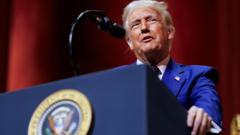As Prime Minister Benjamin Netanyahu arrives in Washington for talks with President Trump, both leaders are poised to discuss significant challenges affecting the Middle East, including the aftermath of the recent Gaza conflict and broader geopolitical alliances.
Netanyahu's Critical Talks with Trump: Navigating Middle East Challenges

Netanyahu's Critical Talks with Trump: Navigating Middle East Challenges
Israeli Prime Minister Benjamin Netanyahu is set to meet with President Donald Trump to address urgent regional issues and the conflict in Gaza.
In an important diplomatic mission, Israeli Prime Minister Benjamin Netanyahu traveled to Washington on Sunday for high-level meetings with President Donald Trump and his administration. This visit comes at a crucial moment following the intense conflict triggered by the October 2023 Hamas-led attacks, leading to a 15-month tumultuous period in Gaza and Lebanon. Netanyahu announced plans to strengthen peace initiatives, aiming to reset the region's dynamics.
In remarks made before his departure, Netanyahu emphasized that decisions taken during the Israeli military operations have transformed the Middle East landscape. He expressed hope that through collaboration, Israel could solidify security and foster a lasting peace, stating, “I believe that we can strengthen security, broaden the circle of peace and achieve a remarkable era of peace through strength.”
Meeting for the first time since Trump’s inauguration last month, Netanyahu is anticipated to engage in in-depth discussions covering a variety of critical topics. These discussions will include negotiations to transition a temporary cease-fire in Gaza into a permanent truce, efforts to secure the release of hostages, and addressing the ongoing threats posed by Iran, particularly regarding its nuclear program and its militia allies.
The timeline for further negotiations is underscored by an imminent deadline. As the trial stage of a U.S.-mediated cease-fire agreement involving Lebanon approaches expiration on February 18, pressure mounts for both the Israeli military and Hezbollah to withdraw from southern Lebanon.
Other key points on the agenda involve fostering relations between Israel and Saudi Arabia, which remain essential for regional stability. On Sunday, Netanyahu discussed with Trump’s Middle East envoy Steve Witkoff the commencement of negotiations pertaining to the Gaza cease-fire agreement, pointing to Witkoff’s significant role in ongoing diplomacy.
Although no immediate statements were issued from the White House or Witkoff’s office regarding these discussions, the outcomes of these meetings could dramatically shape the future of the Middle East and inform the international community's approach to regional peacekeeping and stability.
In remarks made before his departure, Netanyahu emphasized that decisions taken during the Israeli military operations have transformed the Middle East landscape. He expressed hope that through collaboration, Israel could solidify security and foster a lasting peace, stating, “I believe that we can strengthen security, broaden the circle of peace and achieve a remarkable era of peace through strength.”
Meeting for the first time since Trump’s inauguration last month, Netanyahu is anticipated to engage in in-depth discussions covering a variety of critical topics. These discussions will include negotiations to transition a temporary cease-fire in Gaza into a permanent truce, efforts to secure the release of hostages, and addressing the ongoing threats posed by Iran, particularly regarding its nuclear program and its militia allies.
The timeline for further negotiations is underscored by an imminent deadline. As the trial stage of a U.S.-mediated cease-fire agreement involving Lebanon approaches expiration on February 18, pressure mounts for both the Israeli military and Hezbollah to withdraw from southern Lebanon.
Other key points on the agenda involve fostering relations between Israel and Saudi Arabia, which remain essential for regional stability. On Sunday, Netanyahu discussed with Trump’s Middle East envoy Steve Witkoff the commencement of negotiations pertaining to the Gaza cease-fire agreement, pointing to Witkoff’s significant role in ongoing diplomacy.
Although no immediate statements were issued from the White House or Witkoff’s office regarding these discussions, the outcomes of these meetings could dramatically shape the future of the Middle East and inform the international community's approach to regional peacekeeping and stability.























